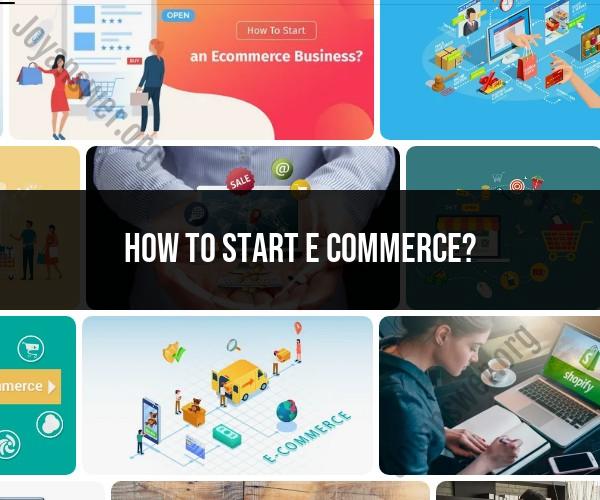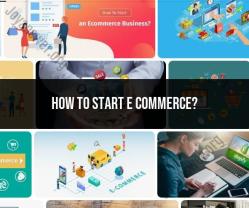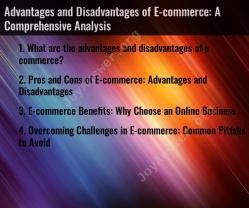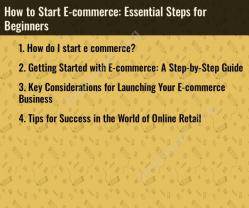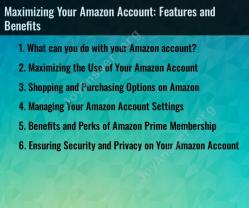How to start e commerce?
Starting an e-commerce business can be a rewarding venture, but it requires careful planning and execution. Here are the key steps and considerations to help you get started with your e-commerce business:
1. Define Your Business Idea and Niche:
- Product Selection: Decide what products or services you want to sell. Research your target audience to determine what products are in demand and have a niche or unique selling proposition.
2. Market Research:
- Identify Your Target Audience: Understand your potential customers' demographics, preferences, and behavior.
- Competitor Analysis: Research existing e-commerce businesses in your niche to identify your competitors, their strengths, and weaknesses.
3. Business Plan:
- Create a comprehensive business plan that outlines your business goals, marketing strategies, budget, and financial projections.
4. Legal Considerations:
- Business Structure: Choose a legal structure for your e-commerce business, such as sole proprietorship, LLC, or corporation.
- Business Name and Registration: Select a unique business name and register it with the appropriate authorities.
- Permits and Licenses: Check and obtain any necessary permits, licenses, or registrations required in your location.
5. E-commerce Platform Selection:
- Choose an e-commerce platform to build and host your online store. Popular options include Shopify, WooCommerce (for WordPress), BigCommerce, and Magento.
6. Website Development:
- Customize your website by selecting a design template, adding product listings, setting up payment processing, and integrating essential features like shopping carts and secure checkout.
7. Branding and Design:
- Create a visually appealing and user-friendly website design. Your branding should reflect your niche and target audience.
8. Product Sourcing:
- Decide how you will source your products. Options include manufacturing your own products, dropshipping, or working with suppliers and wholesalers.
9. Pricing and Profitability:
- Determine your pricing strategy. Consider factors like cost of goods, competitors' prices, and your desired profit margins.
10. Payment Processing:
- Set up secure and convenient payment processing systems, such as credit card processing and digital wallets.
11. Shipping and Fulfillment:
- Plan your shipping and fulfillment process. Decide on shipping methods, carriers, and packaging.
12. Marketing and Promotion:
- Develop a digital marketing strategy to attract customers. This may include SEO, social media marketing, content marketing, email marketing, and paid advertising.
13. Search Engine Optimization (SEO):
- Optimize your website for search engines to improve your visibility in search results.
14. Content Creation:
- Create high-quality product descriptions, images, and content to engage and inform potential customers.
15. Customer Support:
- Provide excellent customer support through multiple channels like live chat, email, and phone.
16. Security and Privacy:
- Ensure your website and customers' data are secure. Implement SSL certificates and data protection measures.
17. Analytics and Monitoring:
- Use web analytics tools to track website performance, user behavior, and sales metrics.
18. Launch and Test:
- Before launching, thoroughly test your website for usability and functionality, and fix any issues.
19. Scaling and Growth:
- Plan for scaling your business as it grows. Consider expanding your product range, reaching new markets, and increasing marketing efforts.
20. Legal and Compliance:
- Stay compliant with e-commerce regulations, such as consumer protection laws and tax requirements.
21. Finance and Accounting:
- Set up accounting and financial systems to keep track of your income, expenses, and taxes.
22. Customer Feedback:
- Encourage customer feedback and reviews to continuously improve your products and services.
Starting an e-commerce business is an ongoing process that requires dedication, adaptability, and continuous learning. It's essential to stay informed about e-commerce trends and emerging technologies to remain competitive and successful in the ever-evolving digital marketplace.
Starting Your E-commerce Journey: Where to Begin
Starting an e-commerce business can be a great way to make money and be your own boss. However, it's important to do your research and plan carefully before you launch your business.
Here are a few steps to help you get started:
- Choose a niche. What kind of products or services do you want to sell? It's important to choose a niche that you're passionate about and that you have some knowledge of.
- Research your competition. Who are your main competitors? What are they doing well? What could they be doing better?
- Define your target market. Who are you selling to? What are their needs and wants?
- Create a business plan. This will help you to map out your business goals and strategies.
- Choose an e-commerce platform. There are many different e-commerce platforms available, such as Shopify, WooCommerce, and Magento. Choose a platform that is right for your needs and budget.
- Set up your online store. This includes adding your products, setting up your shipping and payment methods, and designing your store's layout.
- Promote your e-commerce business. Let people know about your online store through social media, marketing campaigns, and paid advertising.
E-commerce Basics: Setting Up Your Online Store
Once you have a business plan and have chosen an e-commerce platform, you need to set up your online store. This includes adding your products, setting up your shipping and payment methods, and designing your store's layout.
Here are a few tips for setting up your online store:
- Add high-quality product photos and descriptions. Your product photos should be clear and well-lit, and your product descriptions should be informative and persuasive.
- Set up easy-to-use shipping and payment methods. Offer a variety of shipping options and accept all major credit cards.
- Make your store easy to navigate. Customers should be able to find the products they're looking for quickly and easily.
- Design a professional-looking store. Your store's design should be consistent with your brand and should be visually appealing to customers.
E-commerce Best Practices for New Entrepreneurs
There are a few e-commerce best practices that new entrepreneurs should follow:
- Focus on customer service. Provide excellent customer service and make sure that your customers are satisfied with their experience.
- Offer competitive prices and shipping rates. Offer prices and shipping rates that are competitive with your competitors.
- Use social media to promote your business. Social media is a great way to connect with potential customers and promote your products and services.
- Track your results and make adjustments as needed. Track your sales, traffic, and other metrics to see how your business is performing. Make adjustments to your marketing and sales strategies as needed.
Starting an e-commerce business can be a lot of work, but it can also be very rewarding. By following these tips, you can increase your chances of success.
